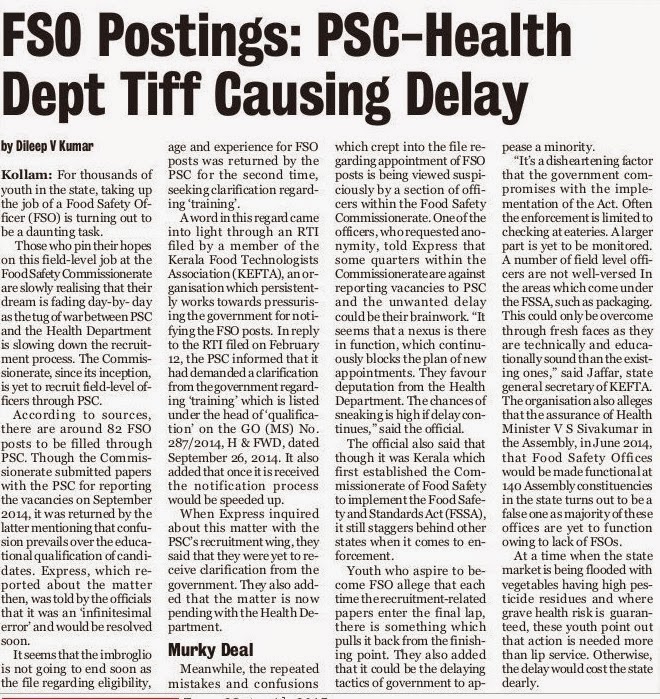KOLLAM:For thousands of youth in the state, taking up the job of a Food Safety Officer (FSO) is turning out to be a daunting task.
Those who pin their hopes on this field-level job at the Food Safety Commissionerate are slowly realising that their dream is fading day-by- day as the tug of war between PSC and the Health Department is slowing down the recruitment process. The Commissionerate, since its inception, is yet to recruit field-level officers through PSC.
According to sources, there are around 82 FSO posts to be filled through PSC. Though the Commissionerate submitted papers with the PSC for reporting the vacancies on September 2014, it was returned by the latter mentioning that confusion prevails over the educational qualification of candidates. Express, which reported about the matter then, was told by the officials that it was an ‘infinitesimal error’ and would be resolved soon.
It seems that the imbroglio is not going to end soon as the file regarding eligibility, age and experience for FSO posts was returned by the PSC for the second time, seeking clarification regarding ‘training’.
A word in this regard came into light through an RTI filed by a member of the Kerala Food Technologists Association (KEFTA), an organisation which persistently works towards pressurising the government for notifying the FSO posts. In reply to the RTI filed on February 12, the PSC informed that it had demanded a clarification from the government regarding ‘training’ which is listed under the head of ‘qualification’ on the GO (MS) No. 287/2014, H & FWD, dated September 26, 2014. It also added that once it is received the notification process would be speeded up.
When Express inquired about this matter with the PSC’s recruitment wing, they said that they were yet to receive clarification from the government. They also added that the matter is now pending with the Health Department.
Murky Deal
Meanwhile, the repeated mistakes and confusions which crept into the file regarding appointment of FSO posts is being viewed suspiciously by a section of officers within the Food Safety Commissionerate. One of the officers, who requested anonymity, told Express that some quarters within the Commissionerate are against reporting vacancies to PSC and the unwanted delay could be their brainwork. “It seems that a nexus is there in function, which continuously blocks the plan of new appointments. They favour deputation from the Health Department. The chances of sneaking is high if delay continues,” said the official.
The official also said that though it was Kerala which first established the Commissionerate of Food Safety to implement the Food Safety and Standards Act (FSSA), it still staggers behind other states when it comes to enforcement. Youth who aspire to become FSO allege that each time the recruitment-related papers enter the final lap, there is something which pulls it back from the finishing point. They also added that it could be the delaying tactics of government to appease a minority.
“It’s a disheartening factor that the government compromises with the implementation of the Act. Often the enforcement is limited to checking at eateries. A larger part is yet to be monitored. A number of field level officers are not well-versed In the areas which come under the FSSA, such as packaging.
This could only be overcome through fresh faces as they are technically and educationally sound than the existing ones,” said Jaffar, state general secretary of KEFTA. The organisation also alleges that the assurance of Health Minister V S Sivakumar in the Assembly, in June 2014, that Food Safety Offices would be made functional at 140 Assembly constituencies in the state turns out to be a false one as majority of these offices are yet to function owing to lack of FSOs.
At a time when the state market is being flooded with vegetables having high pesticide residues and where grave health risk is guaranteed, these youth point out that action is needed more than lip service. Otherwise, the delay would cost the state dearly.








